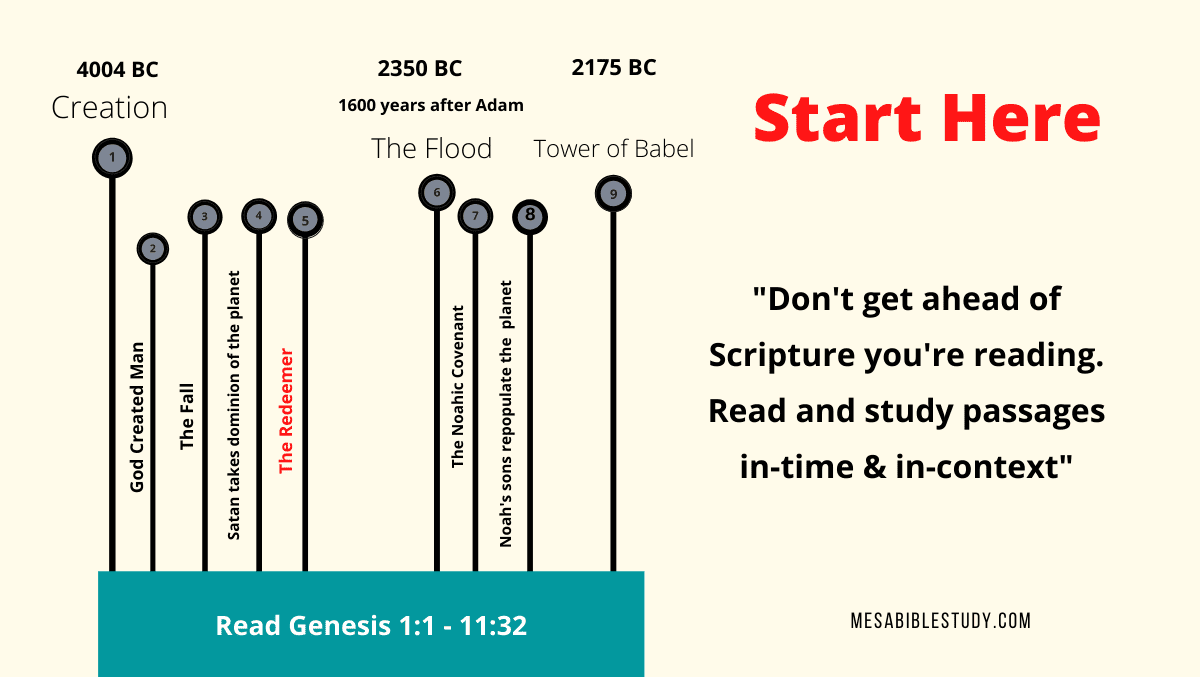The following is an overview of the first 2000 years of Biblical and human history. God deals with all mankind directly and all mankind speaks one language. There is no written law, no temple worship instead God provides mankind simple instructions to both live out their daily lives and how to worship Him.
4000 B.C. – 2000 B.C.
The first two thousand years of Biblical and human history are recorded in the first 11 chapters of Genesis.
Creation, God created man, the fall – sin and the curse come on the scene, Satan takes dominion of the planet, the Redeemer, the flood, the earth repopulated and the tower of Babel.

Outline of First 2000 Years of Biblical History
- Creation – Genesis 1: 2:1-4.
- God created man – Genesis 1:26-27.
- The Fall (Sin and the Curse) – Genesis 3:4-7
- Satan takes dominion of the planet – Matthew 4:8-9; 2 Corinthians 4:4
- The Redeemer – Genesis 3:15
- The Wickedness of Man and the Flood – Genesis 6 & 7.
- Noahic Covenant for All mankind/Human Government – Genesis 6:18, 9:9-17
- Noah & his sons Shem, Ham, and Japheth to repopulate the earth – Genesis 9:1,7
- The Tower of Babel – Genesis 11:1-9.
We Must Know
To be a good Bible student we must “KNOW” (and we can know) how these first eleven chapters of biblical and human history apply to our study of the Bible?
- Is there Doctrine for the body of Christ, in the first 11 Chapters?
- Is there a message of salvation “the gospel” for “mankind” today in these first eleven chapters?
- Are there commands that we must follow in the first eleven chapters of Genesis?
To repeat these first two thousand years of Biblical history are recorded in just the first 11 chapters in the book of Genesis.
Moving ahead 200 years from the Tower of Babel Genesis 11 to the Genesis 12:1-3, and we find that God makes a massive change on how He will reveal Himself to mankind. When He calls out one man…Abram or Abraham as we know him now, to start a people for His name, the Jewish people.
To that end it is crucial know that the Bible is a progressive revelation, and not to get ahead of what God has revealed within a particular time period. It is a wise practice to always ask who’s writing? To whom is the writer writing too? And what are the circumstance for what the writer is revealing?
Study Scripture Don’t Just Read It
Most difficulties in interpreting the Scriptures occur from neglecting a passage’s context. The guiding principle of sound interpretation is taking passage literally unless strong and clear reasons exist for not doing so.
Not sticking to this discipline, interpreting the Scripture becomes whatever you want it to mean. The result is erroneous or ridiculous interpretations.
We can know these answers by asking the following questions;
- Who is the author and who is the author writing too?
- When did the events happen as a “time element”?
- When was it written? (date)
- What are the circumstances?
- What came before and what happened after?
- What has God revealed? (reading in-time, not to get ahead of what God has revealed. In other words, read Genesis 1 – 11, as it was happening at that time and know nothing of future events on what God has revealed at THAT TIME!!!)
By examining a passage with a few simple questions, comparing Scripture with Scripture, and reading the first eleven chapters of Genesis in-time we can establish context. Knowing the context of Genesis 1-11, will greatly help us better understand the full counsel of God. And how to apply the first eleven chapters of Genesis to our Christian walk. And yes we can make application.
‘All Scripture is given by inspiration of God, and is profitable for doctrine, for reproof, for correction, for instruction in righteousness, that the man of God may be complete, thoroughly equipped for every good work.’
II Timothy 3:16-17
‘For whatever things were written before were written for our learning, that we through the patience and comfort of the Scriptures might have hope. ‘
Romans 15:4

0 Comments